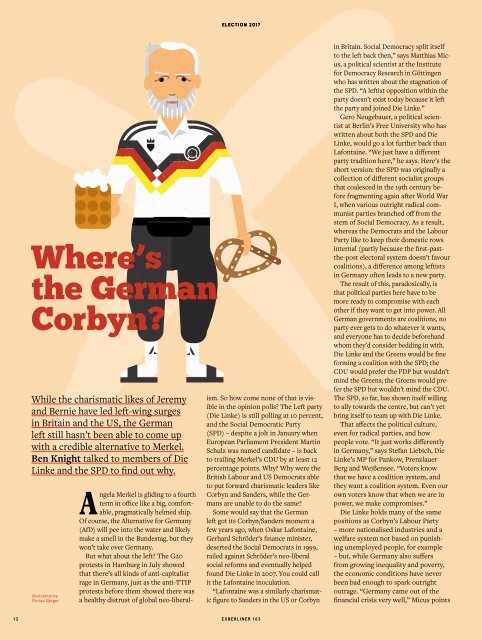EXBERLINER Issue 163, September 2017
You also want an ePaper? Increase the reach of your titles
YUMPU automatically turns print PDFs into web optimized ePapers that Google loves.
ELECTION <strong>2017</strong><br />
Where’s<br />
the German<br />
Corbyn?<br />
While the charismatic likes of Jeremy<br />
and Bernie have led left-wing surges<br />
in Britain and the US, the German<br />
left still hasn’t been able to come up<br />
with a credible alternative to Merkel.<br />
Ben Knight talked to members of Die<br />
Linke and the SPD to find out why.<br />
Illustration by<br />
Florian Sänger<br />
Angela Merkel is gliding to a fourth<br />
term in office like a big, comfortable,<br />
pragmatically helmed ship.<br />
Of course, the Alternative for Germany<br />
(AfD) will pee into the water and likely<br />
make a smell in the Bundestag, but they<br />
won’t take over Germany.<br />
But what about the left? The G20<br />
protests in Hamburg in July showed<br />
that there’s all kinds of anti-capitalist<br />
rage in Germany, just as the anti-TTIP<br />
protests before them showed there was<br />
a healthy distrust of global neo-liberalism.<br />
So how come none of that is visible<br />
in the opinion polls? The Left party<br />
(Die Linke) is still polling at 10 percent,<br />
and the Social Democratic Party<br />
(SPD) – despite a jolt in January when<br />
European Parliament President Martin<br />
Schulz was named candidate – is back<br />
to trailing Merkel’s CDU by at least 12<br />
percentage points. Why? Why were the<br />
British Labour and US Democrats able<br />
to put forward charismatic leaders like<br />
Corbyn and Sanders, while the Germans<br />
are unable to do the same?<br />
Some would say that the German<br />
left got its Corbyn/Sanders moment a<br />
few years ago, when Oskar Lafontaine,<br />
Gerhard Schröder’s finance minister,<br />
deserted the Social Democrats in 1999,<br />
railed against Schröder’s neo-liberal<br />
social reforms and eventually helped<br />
found Die Linke in 2007. You could call<br />
it the Lafontaine inoculation.<br />
“Lafontaine was a similarly charismatic<br />
figure to Sanders in the US or Corbyn<br />
in Britain. Social Democracy split itself<br />
to the left back then,” says Matthias Micus,<br />
a political scientist at the Institute<br />
for Democracy Research in Göttingen<br />
who has written about the stagnation of<br />
the SPD. “A leftist opposition within the<br />
party doesn’t exist today because it left<br />
the party and joined Die Linke.”<br />
Gero Neugebauer, a political scientist<br />
at Berlin’s Free University who has<br />
written about both the SPD and Die<br />
Linke, would go a lot further back than<br />
Lafontaine. “We just have a different<br />
party tradition here,” he says. Here’s the<br />
short version: the SPD was originally a<br />
collection of different socialist groups<br />
that coalesced in the 19th century before<br />
fragmenting again after World War<br />
I, when various outright radical communist<br />
parties branched off from the<br />
stem of Social Democracy. As a result,<br />
whereas the Democrats and the Labour<br />
Party like to keep their domestic rows<br />
internal (partly because the first-pastthe-post<br />
electoral system doesn’t favour<br />
coalitions), a difference among leftists<br />
in Germany often leads to a new party.<br />
The result of this, paradoxically, is<br />
that political parties here have to be<br />
more ready to compromise with each<br />
other if they want to get into power. All<br />
German governments are coalitions, no<br />
party ever gets to do whatever it wants,<br />
and everyone has to decide beforehand<br />
whom they’d consider bedding in with.<br />
Die Linke and the Greens would be fine<br />
forming a coalition with the SPD; the<br />
CDU would prefer the FDP but wouldn’t<br />
mind the Greens; the Greens would prefer<br />
the SPD but wouldn’t mind the CDU.<br />
The SPD, so far, has shown itself willing<br />
to ally towards the centre, but can’t yet<br />
bring itself to team up with Die Linke.<br />
That affects the political culture,<br />
even for radical parties, and how<br />
people vote. “It just works differently<br />
in Germany,” says Stefan Liebich, Die<br />
Linke’s MP for Pankow, Prenzlauer<br />
Berg and Weißensee. “Voters know<br />
that we have a coalition system, and<br />
they want a coalition system. Even our<br />
own voters know that when we are in<br />
power, we make compromises.”<br />
Die Linke holds many of the same<br />
positions as Corbyn’s Labour Party<br />
– more nationalised industries and a<br />
welfare system not based on punishing<br />
unemployed people, for example<br />
– but, while Germany also suffers<br />
from growing inequality and poverty,<br />
the economic conditions have never<br />
been bad enough to spark outright<br />
outrage. “Germany came out of the<br />
financial crisis very well,” Micus points<br />
12<br />
<strong>EXBERLINER</strong> <strong>163</strong>


















